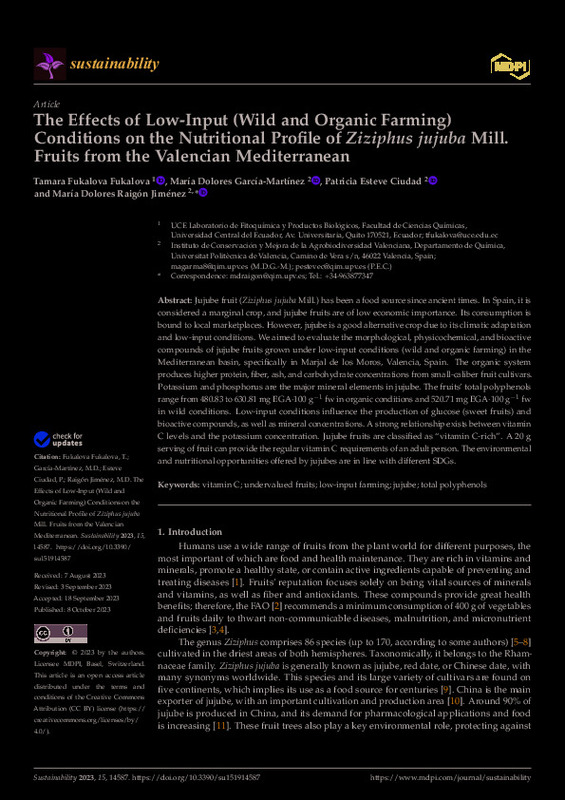JavaScript is disabled for your browser. Some features of this site may not work without it.
Buscar en RiuNet
Listar
Mi cuenta
Estadísticas
Ayuda RiuNet
Admin. UPV
The Effects of Low-Input (Wild and Organic Farming) Conditions on the Nutritional Profile of Ziziphus jujuba Mill. Fruits from the Valencian Mediterranean
Mostrar el registro sencillo del ítem
Ficheros en el ítem
| dc.contributor.author | Fukalova-Fukalova, Tamara
|
es_ES |
| dc.contributor.author | García-Martínez, María Dolores
|
es_ES |
| dc.contributor.author | Esteve Ciudad, Patricia
|
es_ES |
| dc.contributor.author | Raigón Jiménez, Mª Dolores
|
es_ES |
| dc.date.accessioned | 2024-01-11T19:02:16Z | |
| dc.date.available | 2024-01-11T19:02:16Z | |
| dc.date.issued | 2023-10 | es_ES |
| dc.identifier.uri | http://hdl.handle.net/10251/201817 | |
| dc.description.abstract | [EN] Jujube fruit (Ziziphus jujuba Mill.) has been a food source since ancient times. In Spain, it is considered a marginal crop, and jujube fruits are of low economic importance. Its consumption is bound to local marketplaces. However, jujube is a good alternative crop due to its climatic adaptation and low-input conditions. We aimed to evaluate the morphological, physicochemical, and bioactive compounds of jujube fruits grown under low-input conditions (wild and organic farming) in the Mediterranean basin, specifically in Marjal de los Moros, Valencia, Spain. The organic system produces higher protein, fiber, ash, and carbohydrate concentrations from small-caliber fruit cultivars. Potassium and phosphorus are the major mineral elements in jujube. The fruits¿ total polyphenols range from 480.83 to 630.81 mg EGA·100 g¿1 fw in organic conditions and 520.71 mg EGA·100 g¿1 fw in wild conditions. Low-input conditions influence the production of glucose (sweet fruits) and bioactive compounds, as well as mineral concentrations. A strong relationship exists between vitamin C levels and the potassium concentration. Jujube fruits are classified as ¿vitamin C-rich¿. A 20 g serving of fruit can provide the regular vitamin C requirements of an adult person. The environmental and nutritional opportunities offered by jujubes are in line with different SDGs. | es_ES |
| dc.description.sponsorship | The authors thank Anna Pons, of the Environmental Education Center of the Valencian Community, for her direct collaboration, providing the materials used in this study, and for the center's great work in maintaining Mediterranean diversity. The authors would also like to thank Alba Agenjos for her previous work with jujube fruits. | es_ES |
| dc.language | Inglés | es_ES |
| dc.publisher | MDPI AG | es_ES |
| dc.relation.ispartof | Sustainability | es_ES |
| dc.rights | Reconocimiento (by) | es_ES |
| dc.subject | Vitamin C | es_ES |
| dc.subject | Undervalued fruits | es_ES |
| dc.subject | Low-input farming | es_ES |
| dc.subject | Jujube | es_ES |
| dc.subject | Total polyphenols | es_ES |
| dc.subject.classification | EDAFOLOGIA Y QUIMICA AGRICOLA | es_ES |
| dc.title | The Effects of Low-Input (Wild and Organic Farming) Conditions on the Nutritional Profile of Ziziphus jujuba Mill. Fruits from the Valencian Mediterranean | es_ES |
| dc.type | Artículo | es_ES |
| dc.identifier.doi | 10.3390/su151914587 | es_ES |
| dc.rights.accessRights | Abierto | es_ES |
| dc.contributor.affiliation | Universitat Politècnica de València. Instituto Universitario de Conservación y Mejora de la Agrodiversidad Valenciana - Institut Universitari de Conservació i Millora de l'Agrodiversitat Valenciana | es_ES |
| dc.contributor.affiliation | Universitat Politècnica de València. Escuela Técnica Superior de Ingeniería Agronómica y del Medio Natural - Escola Tècnica Superior d'Enginyeria Agronòmica i del Medi Natural | es_ES |
| dc.description.bibliographicCitation | Fukalova-Fukalova, T.; García-Martínez, MD.; Esteve Ciudad, P.; Raigón Jiménez, MD. (2023). The Effects of Low-Input (Wild and Organic Farming) Conditions on the Nutritional Profile of Ziziphus jujuba Mill. Fruits from the Valencian Mediterranean. Sustainability. 15(19):1-17. https://doi.org/10.3390/su151914587 | es_ES |
| dc.description.accrualMethod | S | es_ES |
| dc.relation.publisherversion | https://doi.org/10.3390/su151914587 | es_ES |
| dc.description.upvformatpinicio | 1 | es_ES |
| dc.description.upvformatpfin | 17 | es_ES |
| dc.type.version | info:eu-repo/semantics/publishedVersion | es_ES |
| dc.description.volume | 15 | es_ES |
| dc.description.issue | 19 | es_ES |
| dc.identifier.eissn | 2071-1050 | es_ES |
| dc.relation.pasarela | S\500869 | es_ES |
| dc.subject.ods | 01.- Erradicar la pobreza en todas sus formas en todo el mundo | es_ES |
| dc.subject.ods | 02.- Poner fin al hambre, conseguir la seguridad alimentaria y una mejor nutrición, y promover la agricultura sostenible | es_ES |
| dc.subject.ods | 13.- Tomar medidas urgentes para combatir el cambio climático y sus efectos | es_ES |
| dc.subject.ods | 15.- Proteger, restaurar y promover la utilización sostenible de los ecosistemas terrestres, gestionar de manera sostenible los bosques, combatir la desertificación y detener y revertir la degradación de la tierra, y frenar la pérdida de diversidad biológica | es_ES |








